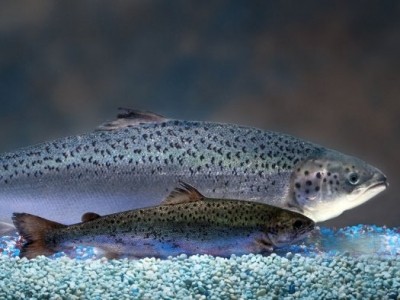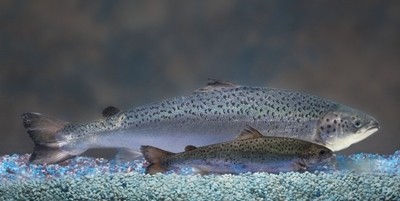Agro groups: Derailing GM fish review would dent FDA’s credibility

The move follows a recent amendment to the Agriculture Appropriations Bill (HR2112) that would stop the FDA from spending appropriated funds to finalize its review of the fish.
AquaBounty Technologies’ AquAdvantage Atlantic salmon includes a gene from the faster-growing Pacific Chinook salmon, which enables it to reach maturity twice as quickly as standard Atlantic salmon.
In the letter, addressed to John Boehner, Nancy Pelosi, Harry Reid and Mitch McConnell, the authors call on Congress to reject the amendment, which was approved by voice on June 15 with only a handful of the House of Representatives’ 435 members in attendance.
Science-based review should not be subject to political intervention
Preventing regulators from completing their assessment of the fish would dent the credibility of the FDA’s science-based approval process, claimed the letter’s 38 signatories, which included the American Meat Institute and the Biotechnology Industry Organization (BIO).
“We do not write to support or oppose this specific application, but rather to register our concern with the House’s action, which if allowed to become law, would disrupt the FDA’s Congressional mandate to base its assessments of human and animal drugs, devices, vaccines, and process applications on the best-available science.”
The authors also cite comments from Dr Calestous Juma of Harvard’s Kennedy School of Government made at a recent hearing on agricultural biotechnology:
“It is not this particular fish that is at stake. It is the principle behind the amendment and its wider ramifications. It sends the message to the rest of the world that the science-based regulatory oversight as embodied in the FDA review process is subject to political intervention.”
‘Frankenstein’ fish…
The amendment to block the approval process was proposed by House Republican Don Young from Alaska, who argues the transgenic salmon could threaten wild salmon populations (a claim that has been consistently denied by AquaBounty).
Speaking in the House on June 15, he said: “It's crucially important we understand that this should not be allowed, for the FDA to say, okay, a genetically raised salmon - I call it a Frankenstein fish - should never be allowed in our markets.”
He was backed by Congressman Sam Farr (Dem-CA), who claimed the fish could have “grave, unintended consequences on human health. Preliminary studies show that the compounds in genetically engineered salmon may be linked to cancer and severe drug allergies.”
Congresswoman Lynn Woolsey (Dem-CA) added: “Because genetically engineered salmon are more sexually aggressive and resistant to environmental toxins, their escape would pose a catastrophic threat to wild salmon populations.”
However, Congressman Jack Kingston (Rep-GA) urged the House to allow the FDA to make a science-based assessment.
“We’re constantly getting on the FDA to use more sound science, less politics, and to have more transparency, and it appears that that's what they're doing here. And they may come out against genetically modified salmon, but they are just looking at it right now to determine.”
A dangerous precedent?
Interfering with the regulatory process in this way would also set a dangerous precedent, warned BIO chief executive Jim Greenwood.
“Disrupting FDA’s science-based assessment process based on non-scientific political concerns would set a dangerous precedent in our country. It is critical that the scientific experts who work within FDA be allowed to conduct comprehensive scientific approvals without political influence.”
AquaBounty chief executive Ronald Stotish has also become increasingly frustrated by the intervention of politicians in the regulatory process, recently accusing senators trying to derail the approval process of “willfully ignoring science-based research” and spreading “misinformed paranoia”.
As the politicians in question were well aware, he said, the transgenic salmon were sterile, exclusively-female, and unable to breed even if they did escape from enclosed, FDA-regulated facilities into the wild.
“The data is out there – although it has been ignored by all of the opposition groups – the FDA has already concluded that there is no food safety or environmental risk. But a science-based review process is being threatened by political shenanigans.”
In its analysis of the AquaBounty technology published last September, the FDA said: "The food from AquAdvantage Salmon that is the subject of this application is as safe as food from conventional Atlantic salmon... In addition, no effects on stocks of wild Atlantic salmon are expected.”















